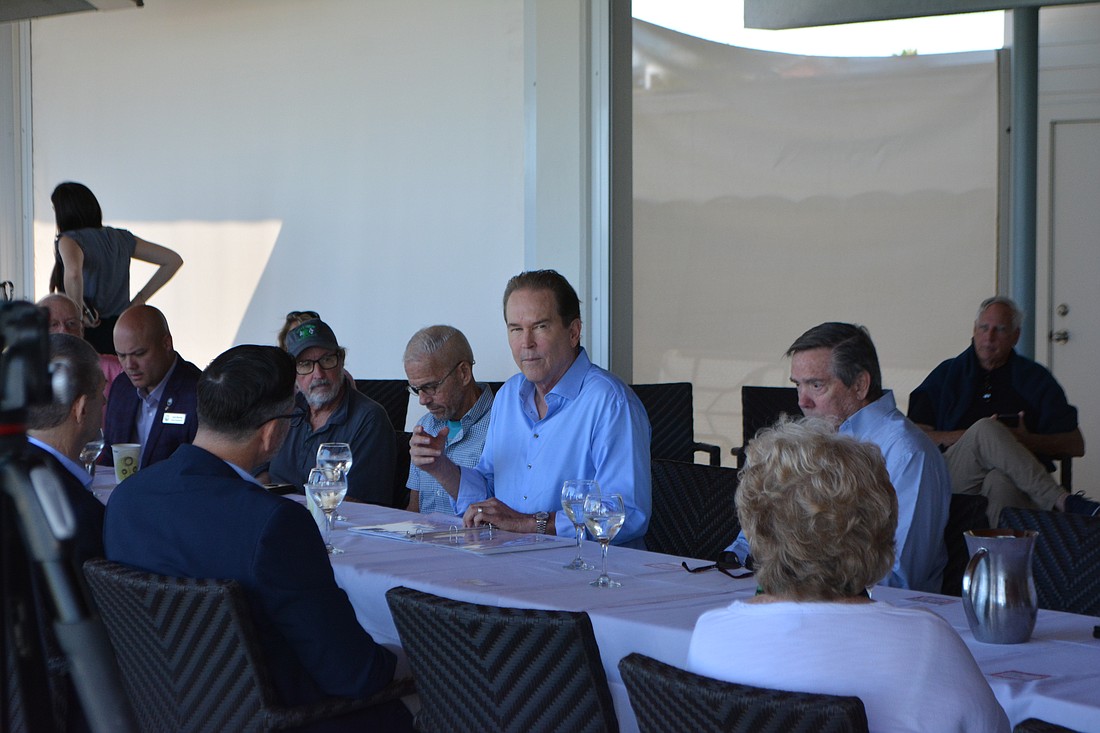- July 26, 2024
-
-
Loading

Loading

Given the recent bout of red tide and how it has affected the area, Longboat Key commissioners participated in a roundtable discussion on the topic hosted by U.S. Rep. Vern Buchanan.
“On the Suncoast, we rely on clean water and white sandy beaches to support our economy and our way of life,” Buchanan said in a statement. “Red tide has wreaked havoc on marine life, our waters and the many businesses that rely on Florida’s tourism-based economy.”
The roundtable, which was held March 17 at Beach House Waterfront Restaurant in Bradenton Beach, allowed local leaders to express concerns about the recent outbreak and bounce ideas off of one another for how to keep future harmful algal blooms from worsening.
Longboat Key Mayor Ken Schneier, Vice Mayor Maureen Merrigan and Commissioners Mike Haycock and Debra Williams and commissioner-elect Gary Coffin attended Friday’s event.
Schneier told attendees about the town’s desire to act as a model community in terms of combatting red tide and ensuring clean waters and asked for recommendations for how the town could reach that goal.
All attendees were in agreement on one thing: Steps needed to be taken to combat red tide and keep it from worsening.
“Florida’s economy is built on the coast,” Ed Chiles, founder of Chiles Hospitality, said. “We are seeing harmful algal blooms and water quality issues come more, longer and stronger.”
The importance of local estuaries to the area in terms of water quality and recreation was at the forefront of discussion as well.
“We have a responsibility to be the stewards of those estuaries,” Chiles said. “All of the things that we love, the habitat, the biodiversity, the fishing opportunities, the ability to be able to go out and recreate all depend on our ability to keep these estuaries healthy.”
Even though the current red tide conditions appear to be improving, Buchanan and fellow roundtable attendees agreed that the conversation needed to continue regardless of the presence and severity of a harmful algal bloom.
“Red tide is a natural occurrence, but at the end of the day, we are aggravating it even more so,” Buchanan said. “The goal is to do everything we can to minimize the red tide. Unfortunately, what I have seen over the years is that we will have a bad bout of red tide, and everybody gets ramped up, and then we don’t deal with it.”
He predicted that as people continue to move to the state in droves, red tide conditions will only worsen unless necessary steps are identified and taken.
Dave Tomasko, the executive director of the Sarasota Bay Estuary Program, was in attendance and called upon to share his knowledge about red tide.
Although it is a naturally occurring organism, Tomasko has said that humans can make it worse with such behaviors as overfertilizing lawns. When hurricanes, tropical storms or even just heavy rains make their way to the area, fertilizer can be pushed into nearby waters, increasing the water's nutrient loads and exacerbating the presence of the organism that causes red tide, Karenia brevis.
In Buchanan’s push to ensure red tide is taken seriously, he introduced a bill in January titled Protecting Local Communities from Harmful Algal Bloom Act. The bill, which would amend the Stafford Disaster Relief and Emergency Assistance Act, would designate red tide as a major disaster. The change would require the Federal Emergency Management Administration to provide both technical and financial assistance to states suffering from outbreaks of red tide.
Outside of simply what steps can be taken, local officials highlighted actions underway to improve water quality, including Manatee County’s $1.3 billion investment in capital improvement projects over the next five years. Projects include replacement of old sewer lines and rehabilitating two of the county’s three wastewater filtration systems.
“When it comes to the quality of life of our citizens and when it comes to the cleanliness of our water, we know that is a primary function of government and we know it is a focus and priority of our citizens, so it’s a priority for us as well,” Manatee County Commission Chair Kevin Van Ostenbridge said.